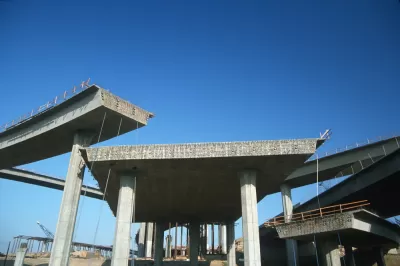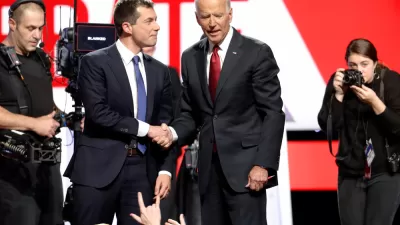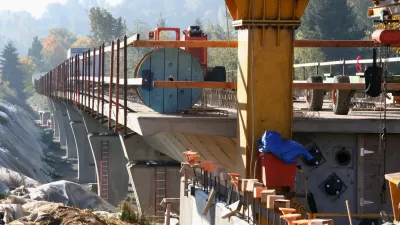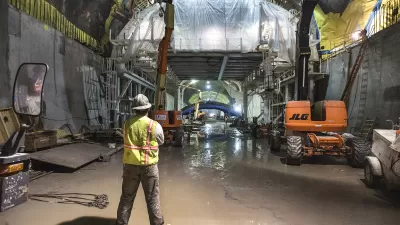While there are many reasons to break away from automobile dominance, the RAISE grant program is the only federal effort fully reflecting a public transit and active transportation priorities.

Laura Bliss reports for Bloomberg CityLab on the potential of the first round of RAISE grant program funding, announced on November 19 by the U.S. Department of Transportation, to make substantive changes to the pro-automobile priorities established by its predecessor program, the Trump administration's BUILD grant program, and over a century of U.S. transportation planning.
According to Bliss, the nearly $1 billion allotted by the RAISE grant program is much more focused on alternative transportation modes (i.e., not road expansion projects). "[O]nly about 5% of RAISE funds will support new roads, and 10% will go to projects that increase road capacity," according to Bliss. "The rest will flow to a mix of projects such as a freeway cap in Atlanta, a greenway project in Cincinnati, transit planning in Omaha, Missoula and Charlotte, and pedestrian and bike safety improvements in Denver, Oakland and Wilmington."
Bliss notes that the financial equation differs greatly from the Infrastructure Investment and Jobs Act (IIJA), which despite spending a record amount on alternative transportation projects also includes record amounts for road building (without the previously planned guardrails that would have made it more challenging for state departments of transportation from spending federal funding on the transportation status quo).
The article includes more insight from transportation experts about how to track and evaluate the use of both RAISE and IIJA funds in the coming months and years.
FULL STORY: Car-Free Transportation Gets Boost from U.S. Grant Program

Study: Maui’s Plan to Convert Vacation Rentals to Long-Term Housing Could Cause Nearly $1 Billion Economic Loss
The plan would reduce visitor accommodation by 25,% resulting in 1,900 jobs lost.

Alabama: Trump Terminates Settlements for Black Communities Harmed By Raw Sewage
Trump deemed the landmark civil rights agreement “illegal DEI and environmental justice policy.”

North Texas Transit Leaders Tout Benefits of TOD for Growing Region
At a summit focused on transit-oriented development, policymakers discussed how North Texas’ expanded light rail system can serve as a tool for economic growth.

Paris Bike Boom Leads to Steep Drop in Air Pollution
The French city’s air quality has improved dramatically in the past 20 years, coinciding with a growth in cycling.

Why Housing Costs More to Build in California Than in Texas
Hard costs like labor and materials combined with ‘soft’ costs such as permitting make building in the San Francisco Bay Area almost three times as costly as in Texas cities.

San Diego County Sees a Rise in Urban Coyotes
San Diego County experiences a rise in urban coyotes, as sightings become prevalent throughout its urban neighbourhoods and surrounding areas.
Urban Design for Planners 1: Software Tools
This six-course series explores essential urban design concepts using open source software and equips planners with the tools they need to participate fully in the urban design process.
Planning for Universal Design
Learn the tools for implementing Universal Design in planning regulations.
Smith Gee Studio
Alamo Area Metropolitan Planning Organization
City of Santa Clarita
Institute for Housing and Urban Development Studies (IHS)
City of Grandview
Harvard GSD Executive Education
Toledo-Lucas County Plan Commissions
Salt Lake City
NYU Wagner Graduate School of Public Service





























